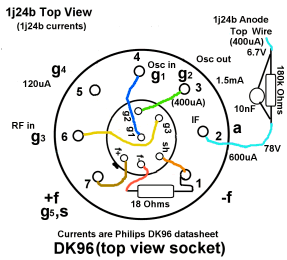DK96 (DK96) vs 1j24b vs 1j37b
? DK96 (DK96) vs 1j24b vs 1j37b
I wish to make LW/MW/SW and VHF superhet like the late 1950s German models which used DF97 in VHF models and typically DK96, DF96, DAF96 and DL96 on AM only sets but with the sub-miniature Russian Rod Pentodes.
Obviously:
DL96 -> 1j29b
DAF96 -> 1j24b + 1N60 (or can G1 be used as an "Anode" of a diode and G3 as control grid, pseudo triode + diode using one 1j24b?)
DF96 - > 1j24b
But a 1j30b isn't really at all like Heptode DK96. 2 x 1j24b is less filament current and one can be oscillator and the other mixer?)
Is a Triode connected 1j24b comparable to DF97 triode connected as it is in the VHF front end of Grundig Concertboy 58?
I'm not going to go out an buy a Grundig Concertboy 59 though, recently one sold over 800€ on Ebay!
Any thoughts?
To thank the Author because you find the post helpful or well done.
This thread was moved automatically.
Posible solutions
It seems you can replace a DK91 and a range of other B7G 1.5V Petagrid converter/Heptodes with DK96, in fact I found an article on changing a radio from D*91 series to D*96 series to save LT power.
But in the Rod Pentode Family no direct replacement for the DK96. Of course the Russians, Czech-Slovaks and East Germans made direct or similar valves to DK91 and DK96 types.
Testing the 1j24b as a Mixer / Oscillator I found that obviously increasing the HT increased the L.O. signal, but in fact the mixer products slightly reduced. The best ratio of modulation signal to L.O. signal was at the 12V to 18V range. G3 modulation with audio worked well. I need to try RF now.
The other probably better solution is ring diode mixer and tube L.O. However that's better at HF to UHF and easier at 30Mhz to 1000MHz than 100kHz to 2MHz due to transformer size and design. Two transformers with one winding on each centre tapped needed.
The 1j37b seems to be used on its own as mixer driven by a 1j29b as an oscillator. That is about 115mA vs 11mA to 14mA for a single 1j24b. DK96 is 25mA, DK91 is 50mA and some similar models are 30mA.
1j29b is about 2 x 27ma, 54mA total on its two filaments and the 1j37b is nearer 60mA on its single filament.
To thank the Author because you find the post helpful or well done.
Conclusion
Using a single Rod Pentode with normal Screen voltage but abnormally high DC series resistance to force low DC Anode voltage works quite well as a replacement of a Pentagrid Mixer/Oscillator of DK96 type.
See 1j24b plugged into a DK96 socket.
The g4 pin of DK95 is not connected. g1 and g2 of the Rod Pentode form the oscillator as on the DK96 and g3 of the rod Pentode is RF and AGC/AVC in. In "plug-in" to a DK91 (1R5?) or DK96 socket a series resistor bypassed with capacitor between socket/plug and rod pentode anode forces the Anode voltage below 7V. The output impedance though is low.
If used in a series heater chain a parallel resistor on the Rod Pentode Filament may be needed depending on which Rod Pentode replaces the DK96.
To thank the Author because you find the post helpful or well done.
This thread was moved back manually because it received a valid answer.
Final Subsitution.

Wiring a 1j24b onto a B7G plug to using in a Radio designed for DK96 with no modifications at all.

Two views of 1j24b on DIY B7G plug
The plug was made of magarine tub lid, 0.9mm wire and glue gun. Commercially made "NOS" B7G plugs are widely available though.
Total cost of replacement under $2 / €1.50 including postage.
The replacement is a bit less sensitive but gives acceptable performance. No noticeable shift in tuning. No realignment needed.
Filament consumption about 12mA to 13mA at 1.5V LT
HT consumption about 800uA at 94V HT
To thank the Author because you find the post helpful or well done.